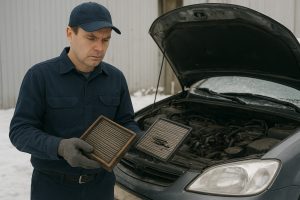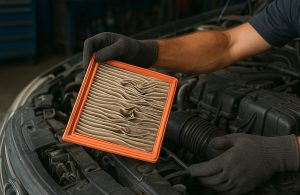Seasonal changes affect not only driving conditions but also the way your car’s filtration system performs. As temperatures shift, dust levels rise or fall, humidity changes, and engine loads vary. All these factors influence how quickly your filters clog or degrade. Preparing your car’s filters for winter or summer is one of the simplest and most effective ways to maintain performance, protect the engine, and ensure clean cabin air all year round.
This guide explains how filters behave in different seasons, what maintenance steps to take before temperature extremes, and which replacements or upgrades may offer better performance.
Why Seasonal Filter Preparation Matters

Filters protect your engine and cabin from contaminants. However, temperature, moisture, and environmental conditions greatly influence filter efficiency and lifespan.
Key seasonal impacts include:
-
Higher dust levels in summer → faster clogging of air and cabin filters
-
Increased moisture in winter → filter saturation and mold growth
-
Pollen spikes in spring → reduced cabin air cleanliness
-
Road salt and debris in winter → increased strain on air and fuel filters
Failing to prepare your filters seasonally may lead to reduced engine performance, higher fuel consumption, poor HVAC airflow, and even premature component wear.
Types of Car Filters Affected by Seasonal Changes
1. Engine Air Filter
Prevents dust and debris from entering the engine. Sensitive to:
-
Dust (summer)
-
Ice or moisture saturation (winter)
2. Cabin Air Filter
Ensures clean air inside the cabin. Affected by:
-
Pollen (spring)
-
Dust (summer)
-
Moisture and mildew (winter)
3. Fuel Filter
Keeps contaminants from reaching the fuel injectors. Affected by:
-
Condensation forming in winter
-
Low-quality fuel during seasonal fuel blends
4. Oil Filter
Works year-round but may struggle with:
-
Thickened oil in cold temperatures
-
Higher thermal stress in summer
Season-by-Season Filter Preparation Guide
Preparing for Winter
Cold temperatures place extra stress on car systems. Moisture and freezing conditions are primary concerns.
Winter preparation checklist:
-
Replace a heavily used air filter to avoid moisture saturation
-
Install a fresh cabin filter to prevent moldy smells from heating system
-
Ensure oil filter is efficient for cold-weather oil viscosity
-
Check for water contamination in fuel filter
Best filters for winter:
-
HEPA or carbon cabin filters for cleaner, drier air
-
High-quality synthetic media engine filters to resist moisture
-
OEM-style fuel filters to handle winter fuel blends
Preparing for Summer
Hot, dusty conditions accelerate clogging and reduce airflow.
Summer preparation checklist:
-
Inspect engine air filter for dust accumulation
-
Replace cabin filter to improve AC performance
-
Ensure oil filter can handle higher temperatures
-
Check fuel filter for contamination after winter condensation
Best filters for summer:
-
High-flow engine filters for maximum cooling airflow
-
Pollen-rated cabin filters for dust-heavy environments
-
Oil filters designed for high-temperature stability
Filter Wear Symptoms to Watch During Seasonal Shifts
Engine Air Filter
-
Reduced acceleration
-
Higher fuel consumption
-
Whistling noises from air intake
Cabin Air Filter
-
Fogging windows
-
Weak AC or heating airflow
-
Smells inside the cabin
Fuel Filter
-
Hard starting
-
Engine hesitation
-
Poor idle stability
Oil Filter
-
Dirty or darkened oil quickly
-
Engine noise on cold starts
-
Reduced performance
Comparison Table: Winter vs. Summer Filter Challenges
| Filter Type | Winter Challenges | Summer Challenges |
|---|---|---|
| Engine Air Filter | Moisture, ice, slow airflow | Dust, sand, debris |
| Cabin Filter | Mold, humidity buildup | Pollen, dust overload |
| Fuel Filter | Condensation, water contamination | Residue from winter fuel blends |
| Oil Filter | Thick cold oil, higher resistance | Heat-stressed oil and contaminants |
How Often Should Filters Be Replaced?

While replacement intervals vary by model and driving style, a seasonal approach helps ensure consistent protection.
Recommended intervals:
-
Engine air filter: every 12,000–20,000 km (check each season)
-
Cabin filter: every 10,000–15,000 km or twice a year
-
Fuel filter: every 30,000–40,000 km
-
Oil filter: every oil change
If you frequently drive in dusty or harsh climates, consider replacing filters more often—especially before summer.
Professional Tips for Seasonal Filter Maintenance
-
Always inspect filters before replacing — don’t rely on mileage alone
-
Consider upgrading to better materials (activated carbon, synthetic media)
-
Keep the HVAC system clean to extend cabin filter life
-
Store spare filters in a dry, sealed location
-
Pair seasonal filter changes with routine inspections
Where to Buy High-Quality Filters
If you’re preparing for winter or summer, choosing reliable, well-made filters makes all the difference. High-quality engine, cabin, fuel, and oil filters are available here:
buy filters online
Conclusion
Seasonal filter preparation isn’t just optional maintenance — it’s an essential part of ensuring that your car runs reliably throughout the year. Both winter and summer introduce specific challenges that can dramatically shorten the life of your air, cabin, fuel, and oil filters. Taking the time to check, clean, or replace these components helps preserve engine health, improves fuel efficiency, and enhances cabin comfort.
By understanding how filters react to seasonal conditions and choosing the right materials for each climate, you can extend the lifespan of your vehicle and avoid unexpected breakdowns. Whether it’s dust in summer or moisture in winter, proactive seasonal preparation keeps your car performing at its best.